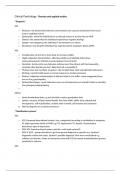Summary
Summary - Unit 5 - Clinical psychology
- Course
- Institution
Summary notes for Alevel Edexcel clinical psychology. Notes consist of A01, A02, A03 and Ao3CA points. Description of point, evidence for point, evaluation and evaluation of the counterargument. Summary points include required studies and led to me achieving an A in Alevel Psychology. Content in...
[Show more]



